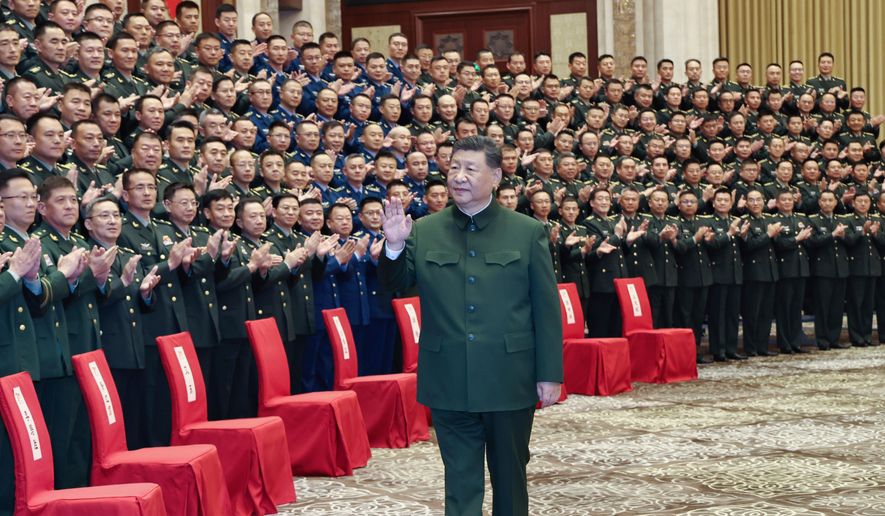A version of this story appeared in the daily Threat Status newsletter from The Washington Times. Click here to receive Threat Status delivered directly to your inbox each weekday.
OPINION:
The Fourth Plenum of the Chinese Communist Party last week included a purge of China’s senior military leaders, culminating in more than two years of the removal of senior military officials once loyal to President Xi Jinping.
The past two defense ministers, Wei Fenghe and Li Shangfu, were removed in October 2023 and June 2024. Now, He Weidong, vice chairman of the Central Military Commission, was expelled from the party and military for “serious violations of Party discipline.” Adm. Miao Hua, director of the Political Work Department (responsible for the political/ideological work in the military), was removed from the commission in June and later officially expelled.
The list goes on and on. It includes Lin Xiangyang, former commander of the Eastern Theater Command; Wang Houbin, former commander of the PLA Rocket Force; Wang Chunning, former commander of the People’s Armed Police. These are just three of eight or nine senior military officers purged this month.
Purges of senior officials are not new to China. On July 1, 1989, Zhao Ziyang was removed as the party’s general secretary and vice chairman of the Central Military Commission for supporting the students during the June 1989 Tiananmen Square demonstrations. On July 1, 1987, Hu Yaobang was removed as the party’s general secretary for supporting the students who were demanding more democracy. Deng Xiaoping accused Mr. Hu, a former protege of his, of “bourgeoise liberalization.”
In 1971, Lin Biao, Vice Chairman of the Chinese Communist Party and his wife, Ye Qun, planned the assassination of Chairman Mao Zedong, to replace Mao as the supreme leader. The plot was discovered, and Lin Biao died in an airplane crash as he was fleeing for his life.
Many of the recently purged generals, including He Weidong and Adm. Miao Hua, worked in the 31st Group Army stationed in Fujian province during the 1970s and 1980s. This region is the front line for any potential military operation against Taiwan. In fact, He Weidong later served from 2019 to 2022 as commander of the Eastern Theater Command, the unit responsible for operations concerning Taiwan.
Gen. He was a member of the Communist Party’s Politburo and vice chairman of the Central Military Commission, the third-highest-ranking military official in China. His professional prominence was also a result of his association with Mr. Xi, but Gen. He and eight other senior military officers were expelled this month from the Communist Party and the military. They, in fact, were referred for criminal prosecution on charges of corruption and “serious violations of discipline and law.”
Gen. He and the other purged generals all had connections to Fujian and the former Eastern Theater Command commander Lin Xiangyang and Navy Adm. Miao Hua. It would be fair to assume that these senior military officers disagreed with some of Mr. Xi’s policies toward Taiwan.
Given the importance of Taiwan to Mr. Xi and the Communist Party, a disagreement with senior military officials over Taiwan could develop into an issue that affects the inner workings of the party. Mr. Xi has consistently refused to renounce the use of force to bring Taiwan under its control and continues to conduct military exercises near Taiwan. Mr. Xi maintains, however, that “peaceful reunification” is preferable but reserves the option of using force, particularly in response to “external forces” or “separatist activities” in Taiwan.
Hopefully, Mr. Xi will pursue a policy of peaceful reunification with Taiwan and immediately halt military exercises and related activities to intimidate Taiwan.
• The author is the former director of East Asia operations at the CIA. All statements of fact, opinion and analysis expressed are those of the author and do not reflect the official positions or views of the U.S. government. Nothing in the contents should be construed as asserting or implying U.S. government authentication of information or endorsement of the author’s views.




Please read our comment policy before commenting.